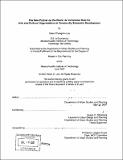The new partner on the block : an unfamiliar role for arts and cultural organizations in community economic development
Author(s)
Lee, Helen Chongmin
DownloadFull printable version (7.729Mb)
Other Contributors
Massachusetts Institute of Technology. Dept. of Urban Studies and Planning.
Advisor
Susan C. Silberberg.
Terms of use
Metadata
Show full item recordAbstract
This thesis looks at three case studies of arts and cultural organizations in New York City that have chosen to go beyond their traditional roles and business-as-usual practices to engage in community economic development in their neighborhoods. The cases include the Brooklyn Academy of Music, a performance arts center; the Heart of Brooklyn, a consortium of cultural institutions; and the Bronx Council on the Arts, a quasi-public arts service organization. An important finding of this thesis is that arts and cultural organizations have much to offer to urban communities like other private players such as foundations, corporations and universities, and they may be the new community partner on the block. The case studies show that these nonprofits are interested and can take part in a wide variety of community economic development activities: physical development, neighborhood and commercial revitalization, and job training. The evidence also suggests that these organizations are more prone to take on place-based projects since they are increasingly dependent on their own revenue sources and are interested in upgrading their neighborhoods to build audiences. (cont.) Some caution must be exercised since these place-based activities may accelerate the displacement of residents and small businesses in neighborhoods that are gentrifying like the communities in this thesis. One outlier among the cases is the Bronx Council on the Arts, which is focusing on human capital development through job training programs, due to its quasi-public mission of serving both "artists and people." Finally, the research reveals a few words of caution regarding the practices of arts and cultural organizations as they take on community economic development roles. First, their planning efforts lack transparency and active engagement of key stakeholders such as residents and community-based organizations. This may be due to the organizations' reliance on private foundations to fund the initial planning stages. Second, and in part because of the lack of broader engagement, their efforts may result in one-sided planning that decreases the chances of creating equitable and sustainable outcomes.
Description
Thesis (M.C.P.)--Massachusetts Institute of Technology, Dept. of Urban Studies and Planning, 2007. Page 96 blank. Includes bibliographical references (p. 91-95).
Date issued
2007Department
Massachusetts Institute of Technology. Department of Urban Studies and PlanningPublisher
Massachusetts Institute of Technology
Keywords
Urban Studies and Planning.